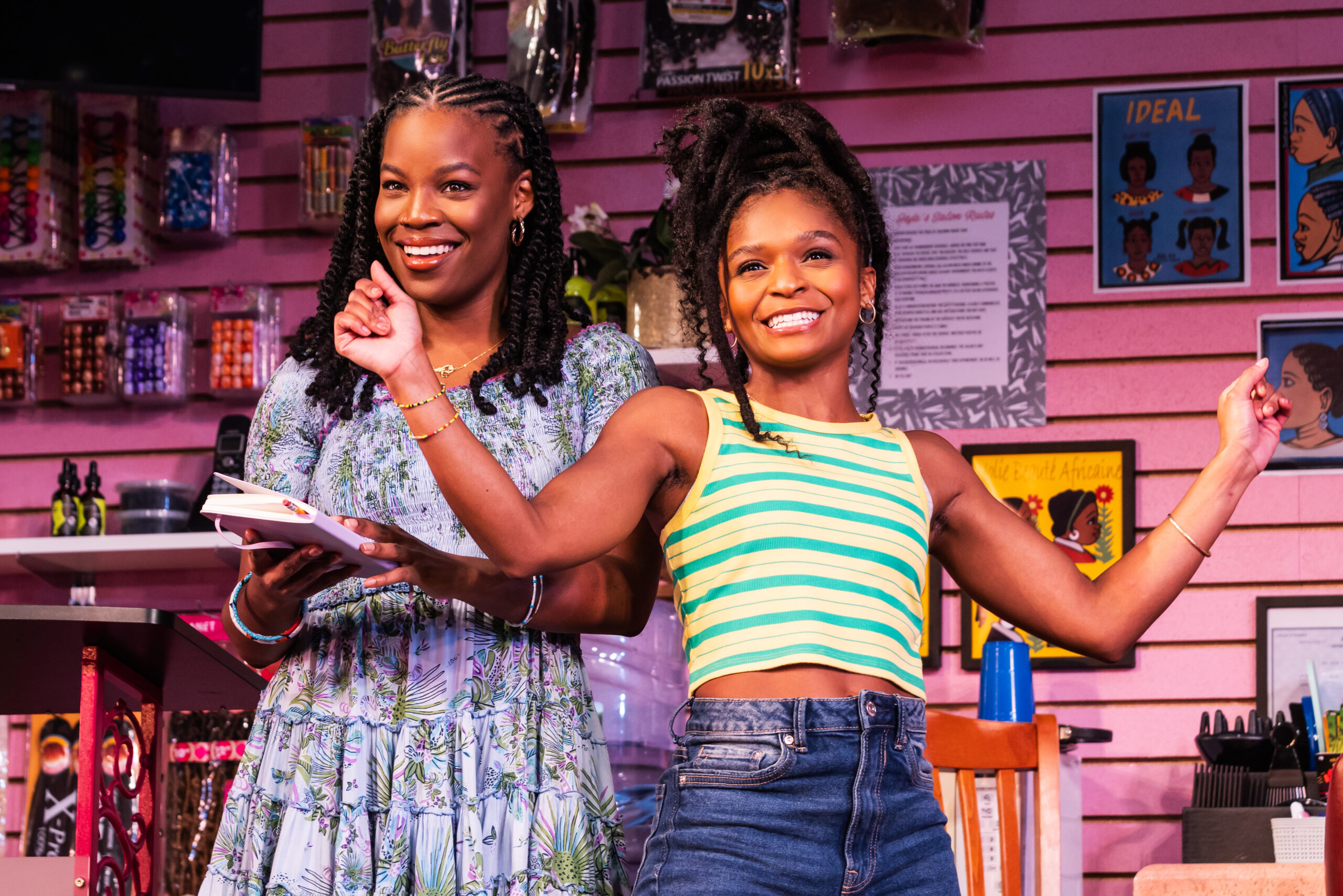NEW YORK CITY — When a small town critic from Utah has a weekend trip of critiquing in New York City, why would she go out of her way to watch a play about African hair braiding? JaJa’s African Hair Braiding, by Jocelyn Bioh and directed by Whitney White, represents everything that is wonderful and exciting about the future of American theatre.
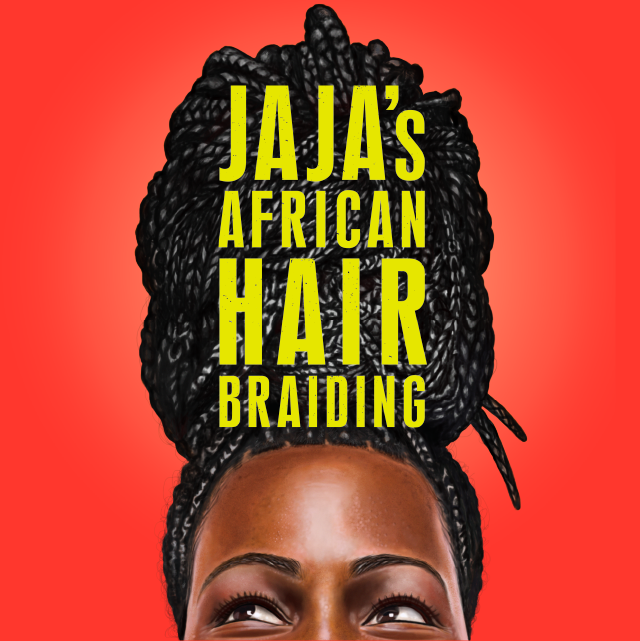
When critics speak of voices and stories that are not being told, Jaja’s African Hair Braiding actually tells a story that many people do not understand. And the relevance of that story cannot be overstated. In 2019, California became the first state to pass the CROWN Act, which aims to eliminate bias in schools and workplaces based on hairstyle. Seeing as this was only 4 years ago, yes, telling stories surrounding culture and hair are very relevant.
One reason I was excited to be given press tickets to JaJa’s African Hair Braiding was because of the recent exciting announcement that the show, which closes on November 19, will be streaming the last week of performances live and offering audiences around the country the chance to buy a ticket and watch from home. Some have criticized the steep ticket price ($69), it is still far cheaper than the cost of visiting New York City. Even if a Broadway tour is coming to town and the ticket costed less than $69, it is unlikely that a show like this might not be on the rotation. Therefore, a fan like myself might consider it. The question then becomes, is it worth it to see JaJa’s African Hair Braiding from home for $69?
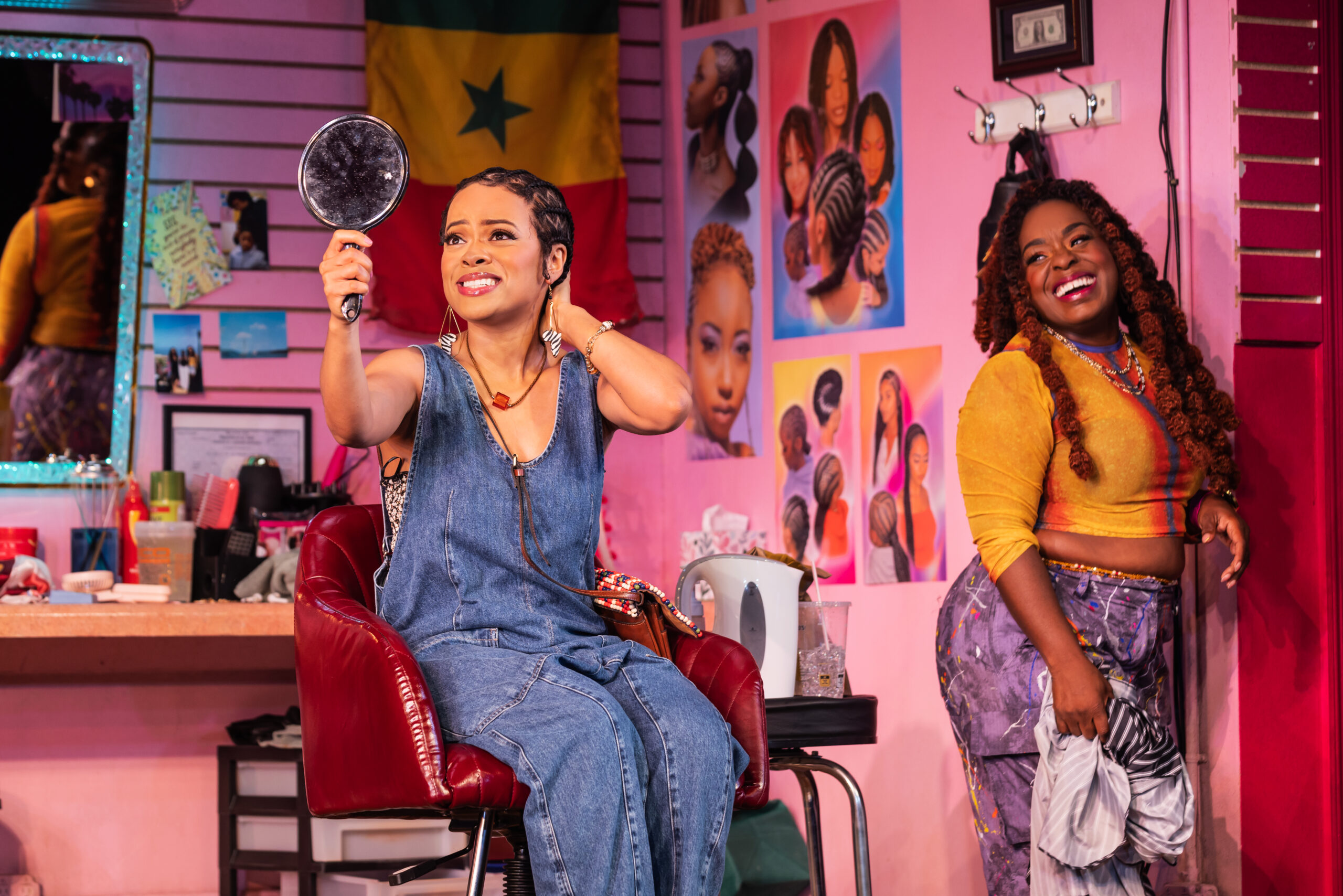
Just as I felt with my viewing last night, the first thing I noticed about this show was representation. I spent part of my career as a counselor for the refugee and immigrant population in Salt Lake City, and one of the things my clients talked a lot about was the lack of places to have proper hair care. Many schools of cosmetology in the United States do not teach the handling, styling, and management of diverse hair. So, to sit in the audience and see so many amazing hair styles, which were also reflected on the backdrop of the show before it began (with images and names of styles of braids), I again felt a surge of thrill in wanting to have a variety of stories from every source possible.
The production follows a simple day in the life of the workers in the salon. They all hail from different parts of Africa and are all there making money braiding and hoping to have a better life in different ways. Miriam (played by Brittany Adebumola) from Sierra Leone left her daughter with her mother in Africa and has come to the US to try and better situation. Adebumola has the first of many moving speeches by the cast, in which her character describes how she has been abused in the past and how she broke free of that and that now she wants to be loud. The level of humor mixed with power in her speech was inspiring.
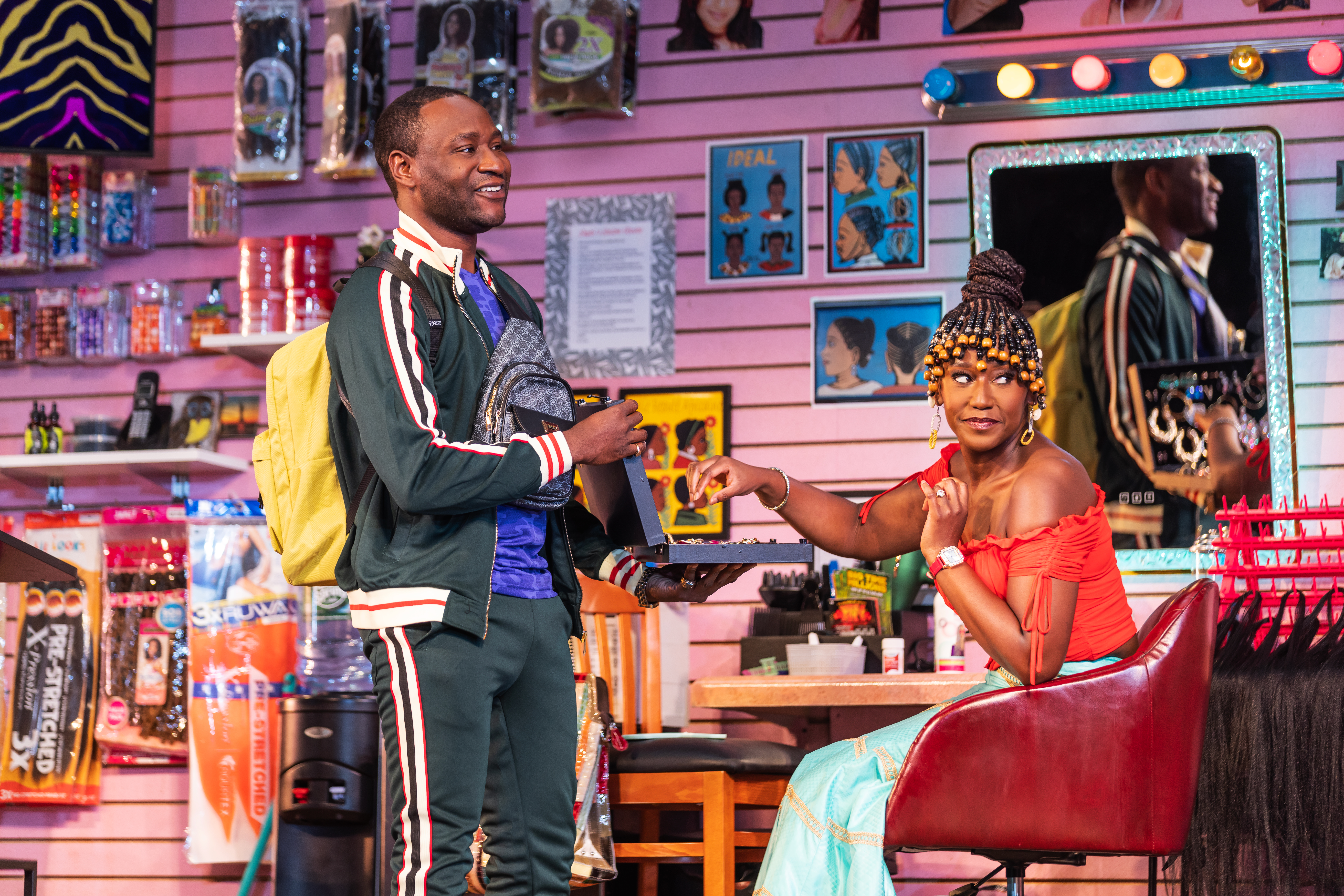
Humor was in abundance in this show, as was joyfulness. The salon truly felt like a fun place to experience and work at, as each of the women would go about their business and get into each others and start fights and stop others. Bea (played exquisitely by Zenzi Williams) has worked at the shop the longest and dreams of opening her own, but has not been able to achieve that dream. She gets angry with Ndidi (played by Maechi Aharanwa), who is working at the shop temporarily because of a fire at her permanent shop, but keeps stealing her customers because of her ability to braid quickly. The fight between the two of them was so hilarious that the audience was cheering.
Kaylene Coleman and Lakisha May play different customers that come into the shop, and they both add a great deal to the comedic feel. Rachel Christopher also plays a customer, Jennifer, who wants braiding so small that she stays on stage for most of the action, and her facial expressions as she watches all the drama are worth the price of the show alone. Michael Oloyede, as the solo male in the production, plays a variety of roles, from a random street seller peddling his wears as the shop’s customers get their hair done to try, to Aminata’s no-good husband. Seeing the difficult dynamic between Aminata (played by Nana Mensah) and her husband, and then the reactions of the characters in the salon and the women in the audience, I could tell that many of these salon experiences felt universal.
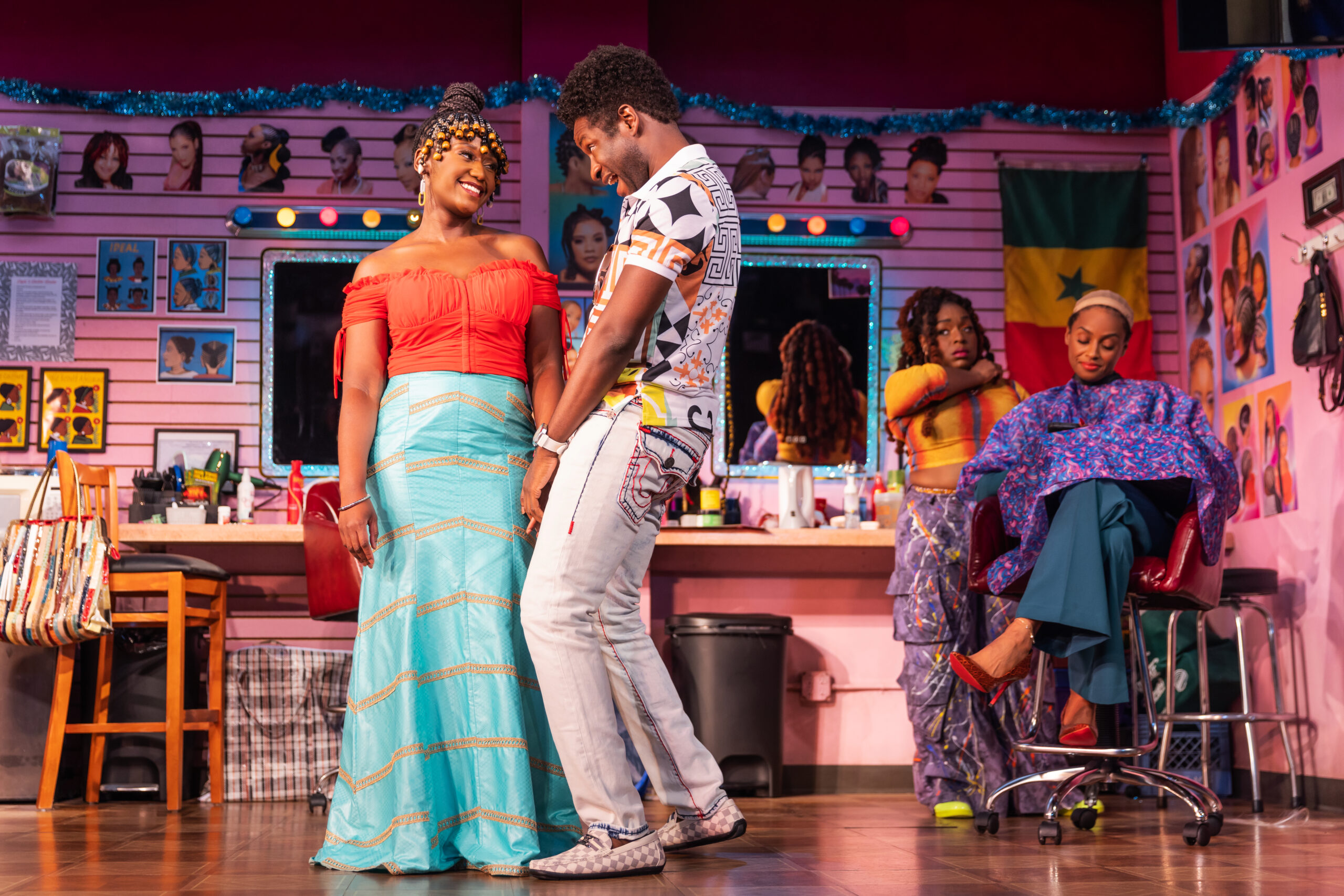
Finally, there is JaJa herself (played by Somi Kakoma) and her daughter, Marie (played by Dominique Thorne). Much of the story centers on how JaJa started this salon so she could have the money to send Marie to private school and eventually become a doctor, but Marie has other hopes. Both Thorne and Kakoma play well this dynamic of mother and daughter and misunderstanding.
Underscoring all of this humor, smiling, and a lot of dancing, is a surprising and heart wrenching theme of immigration, acculturation, and challenges that are imbedded in that life. This underlying theme takes an unexpected turn near the end of this 90-minute show that moved me to tears because of the memories and moments I have spent with immigrants in my career and personal life. Williams has a moment at the end of the play where, Bea, despite fighting with others throughout the day, when things turn tragic and there is a need, she steps up, helps everyone gather round, and shows a beauty and strength that was resonating in the theatre.
Is it worth $69 to stream this world premiere production this week? There has been a lot of discussion in the theatre circles that I run in that streaming is not the same, that it will kill live theatre. Streaming would not be the same as being in the theatre. I always will choose first to attend a live production. But, Jaja’s African Hair Braiding is the next best thing: a high-quality Broadway show production that is moving, inspiring, and different than what most Americans can see on stage in their hometowns. I highly advocate considering getting a streaming ticket to JaJa’s African Hair Braiding.
[box]The Manhattan Theatre Club’s Broadway production of Jaja’s African Hair Braiding plays at various times through November 19, at the Samuel J. Friedman Theatre (261 Est 47th Street, New York City). Ticket prices vary. For more information, visit www.manhattantheatreclub.com/shows/2023-24-season/jajas-african-hair-braiding. To purchase a $69 ticket to a livestream (not a recording) of a performance of Jaja’s African Hair Braiding, visit https://www.lolst.org/?via=JAJA-MTC-web.[/box]
